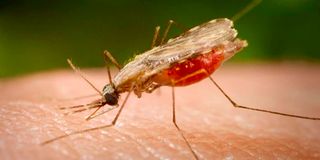Health experts meet in Dar over use of GMO mosquitoes to fight Malaria

Anopheles mosquito
Regional health think thanks led by the African Institute for Development and Policy (AFIDEP), East African Community(EAC) Health department, East African Health Research Commission and Ifakara health institute will be meeting in Dar es Salaam, Tanzania for three day starting tomorrow to discuss the development of genetically modified mosquitoes to help in controlling and eliminating malaria.
The experts will also be discussing regulatory reforms and policies, given that regulatory frameworks of many African countries do not provide clear guidance on how to develop and test genetically modified mosquitoes.
According to the Centers for Disease Control and Prevention (CDC), genetically modified mosquitoes are mass produced in a laboratory to carry two types of genes.
One is a self-limiting gene that prevents the female mosquito offspring from surviving to adulthood. The other gene, called a fluorescent marker gene, which glows under a special red light, and which allows researchers to identify GM mosquitoes in the wild.
When produced in the lab, these mosquitoes lay eggs that carry these two genes, which are then released into an area. Upon hatching and growing to adulthood, these mosquitoes mate with females in that area, passing the genes to the offspring.
The female offspring, which usually transmit the malaria virus, die before reaching adulthood reducing mosquitoes and infections.
Professor Richard Mukabana, a Project Director of the Health Tech Platform at AFIDEP explained that the idea of using GM mosquitoes is good, but could take at least ten years before it can be used.
“The use of genetically modified mosquitoes is a novel approach to solving the problem of malaria in Africa. However, this technology is still under development and is not ready for field deployment. It will take about one decade or so before the technology is available for use on the continent,” said Professor Mukabana.
He added; “Given that this technology is targeted for use on the continent, African countries should consider to jointly develop and harmonise their regulatory and legal frameworks to guide the process. This will help to stem potential cross-border conflicts and ensure that any strategy undertaken to address the high burden of malaria in the region truly works to alleviate the suffering caused by malaria.”
Currently, Mali, Uganda and Burkina Faso are conducting research under laboratory conditions, while Tanzania, Cape Verde, Sao Tome and Principe and Comoros focus on exploring the technology that will be used.
The eradication of malaria will be a dream come true, as it’s a life threatening disease affecting Sub Saharan Africa.
According to the World Health Organisation (WHO), 95 per cent of the 241 million cases reported came from Sub Saharan Africa.
WHO says that in 2020, the region recorded 96 per cent of malaria deaths, with children aged under five accounting for about 80 per cent of the deaths.
“There were 241 million cases of malaria in 2020 compared to 227 million cases in 2019. The estimated number of malaria deaths stood at 627 000 in 2020, an increase of 69,000 deaths over the previous year. Nigeria, the Democratic Republic of the Congo, Tanzania and Mozambique accounted for just over half of all malaria deaths worldwide,” says WHO.
“Over the last decade, antimalarial drug resistance has emerged as a threat to global malaria control efforts in the Greater Mekong sub-region. WHO is also concerned about more recent reports of drug-resistant malaria in Africa. Regular monitoring of drug efficacy is needed to inform treatment policies in malaria-endemic countries, and to ensure early detection of, and response to, drug resistance,” the health agency added.





